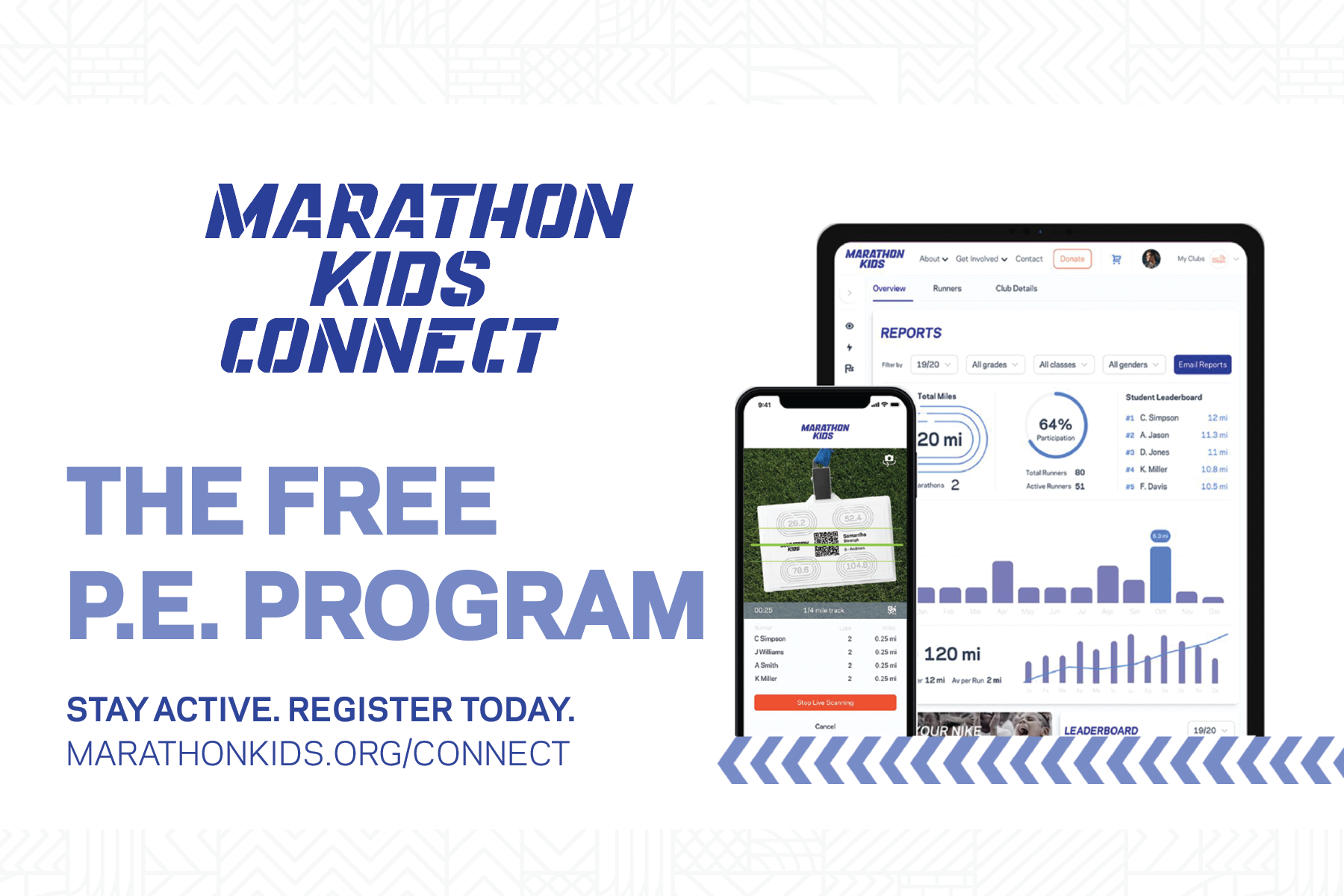Back in 2010, the federal government launched Healthy People 2020, a national initiative that sets science-based objectives for improving the health of all Americans. Based in part on the widely known, research-based correlation among kids, exercise and mental health, Healthy People 2020 recommends that adolescents get a minimum of 60 minutes of moderate to vigorous physical activity (MVPA) every day, yet most children in the United States don’t move their bodies anywhere near that much.
The Marathon Kids mission to get kids moving and set them on the path to healthier lives is based on the same research that led to the Healthy People 2020 recommendation. That’s why we’re so passionate about what we do—we know the connections among kids, exercise and mental health, we know the importance of MVPA for everyone, and we know how crucial it is for kids to move their bodies on a regular basis. We also know that, unfortunately, many children with school, homework and other time-consuming obligations have a hard time reaching that minimum daily movement recommendation.
The Link Between Kids, Exercise and Mental Health:
Daily Physical Activity Can Alleviate Anxiety and Depression in Children
Getting enough exercise can become even more difficult during winter months due to frequently inclement weather and early sunsets. Understandably, many kids aren’t allowed to play outside in the cold after dark, and sedentary screen time often takes over. Compounding the problem, most school districts around the country struggle to incorporate physical exercise into their schools’ daily schedules as they deal with curriculum shifts and budget cuts while striving to meet national academic standards. Plenty of schools no longer provide daily P.E. class, and recess is often only 10 to 20 minutes long. Kids simply aren’t getting enough daily movement.
Physical Activity Improves Academic Performance
The irony is that children would likely perform better academically if they had more school time devoted to physical activity—including not just team sports, but also movement that is less for competition or achievement than for fun and overall health. Research has shown repeatedly that physical activity improves children’s focus, sleep, and energy levels, all of which boost their performance at school.
Essential brain functions are improved by regular, moderate-intensity exercise. Research has even shown that MVPA has a direct, positive effect on the hippocampus, an area of the brain that governs memory and learning. Physical activity helps children improve their hand-eye coordination and motor skills, along with their attention and problem-solving skills. It may seem counterintuitive, but the research is clear: If kids moved their bodies more, improved academic performance would follow.
Regular Exercise Is Also Good for Kids’ Mental Health
The benefits of MVPA, however, don’t stop there. Research published in the U.S. and around the world has shown that regular, moderate to vigorous physical activity—including such activities as walking, hiking, riding a bike, playing basketball or going
for a run—isn’t good just for children’s physical health but for their mental health as well. Children who develop the habit of regular physical activity at a young age have lower rates of depression and anxiety than their less active peers. Exercise releases endorphins in the brain that elevate a person’s mood along with their energy levels. The same hormones continue working well after the exercise session has ended to improve sleep, lending further benefits for mood, focus and overall mental health.
Research has even shown that regular MVPA has a positive effect on body image as well as on relationships, both of which can be fraught for children navigating the modern world. Kids today must live with numerous social, commercial and societal pressures, including the pressure to conform to unrealistic beauty standards and social media has changed the landscape of
their friendships as well as their relationships with parents, teachers and other adults.
Physical Activity Helps with Mindfulness and Connection
Regular exercise can help, shifting kids’ focus from their daily problems—that big project due at school, the mean thing someone said about them on social media, the weird look a friend gave them at lunch—to the present moment. Exercise, especially moderate- to vigorous-intensity exercise, can be challenging; in the best way, it can force a person to focus only on the task at hand, rather than spinning off into anxious thoughts about the past and the future. In this way, physical activity has a meditative effect, guiding people toward mindfulness by helping them live in the moment.
Physical activity can also give kids a sense of satisfaction and accomplishment as their skills improve and they meet milestones they might not have known they could reach. And whether children play team sports or pursue less competition-based activities like running or hiking, engaging in shared physical activity with other young people can give them a sense of community and belonging while alleviating social anxiety. After all, it’s always easier to connect with others around a shared project or goal.
Regular Physical Activity Has Mind and Body Benefits for Everyone, Including Kids
If 60 minutes a day of physical activity sounds daunting, it can be broken into shorter chunks rather than having to be done all at once. Even just 20 minutes a day, while falling far short of that 60-minute goal, has positive mental health and academic performance benefits for children. With our stress-filled lifestyles, prioritizing daily physical activity is a no-brainer. It’s not just about building strong, healthy bodies, or even strong, healthy brains. It’s about living a longer, calmer and more connected, satisfying and fulfilling life.
Make Marathon Kids Your PE Partner
